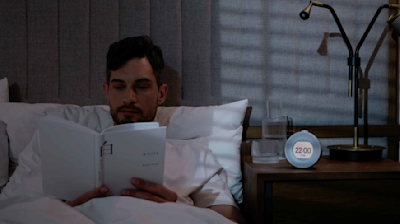
Fix Your Sleep Schedule After a Summer of Fun & Late Nights
Back to Reality
Just stepped off the plane from your blissful summer vacation? Spent those summer nights reveling under the stars till late and waking up when the sun is midway up in the sky? If you've thrown your sleep schedule to the wind during your holidays, it's time to buckle up and reset your internal clock.
Let's face it - summer vacations are all about stepping out of our routine, enjoying late-night parties, and sleeping in. However, as we get back to reality, our disrupted sleep schedule often tags along, leaving us groggy in the mornings and restless at nights. At Mudita, we’re here to help you establish a healthy sleep routine and regain your sleep hygiene.
Let’s get right into it and explore tips and tricks to facilitate your transition back to a healthy sleep pattern, combat sleep inertia, and improve your overall sleep hygiene.
Sleep is that golden chain that ties health and our bodies together. - Thomas Dekker
With Dekker's words in mind, let's embark on a journey towards better sleep and better health. Buckle up and get ready to regain control over your snooze button!
Understanding the Importance of a Consistent Sleep Schedule
Who doesn't love the freedom of summer vacation? Late nights, parties that last till dawn, long lie-ins, and the all-too-frequent afternoon siestas. However, as we wave goodbye to the leisurely summer months, our bodies often struggle to adapt to a more structured sleep routine. As if the post-vacation blues weren't enough, right?
However, before we dive into the how-tos of resetting your sleep schedule, let's first understand why it's so important.
Consistency is key when it comes to quality sleep.
Our bodies operate on a circadian rhythm, an internal clock that regulates our sleep-wake cycle. Disrupting this cycle, like we often do during those sun-soaked summer days, can lead to a range of sleep problems.
Difficulty falling asleep
Waking up frequently during the night
Feeling unusually tired during the day
Moreover, irregular sleep patterns can upset the balance of our mental and physical health. This can manifest in various ways, including: Mood swings, decreased concentration, memory problems, weakened immunity, and an increased risk of chronic conditions like heart disease and diabetes.
In short, a consistent sleep schedule is more than just about getting enough shut-eye. It's an essential part of maintaining our overall well-being. Now, let's get your sleep schedule back on track, shall we?
From Night Owl to Early Bird
Transitioning from a nocturnal night owl to a chirpy early bird is no easy feat, especially if late nights are ingrained in your lifestyle. However, with intentionality and dedication, you can reorient your circadian rhythm to embrace the dawn. Here’s our transformative guide to help you make that shift:
1. Stick to a Steady Schedule
The Power of Habit: We can stress this one enough. Your biological clock thrives on consistency. By going to bed and waking up at the same time every day, you're training your body to expect sleep at a particular time. If you’ve been going to sleep at unusually late times, it’s best to start adjusting your schedule a little bit at a time. Move your bedtime and wake-up time up by 15-30 minutes each day until you reach your desired sleep schedule. Remember, it's the little habits that often make the most significant difference. If your schedule has to change, try to make sure it’s only by only an hour or so at a time.
2. Create Your Perfect Sleep Environment
Your Sanctuary of Sleep: Your environment plays a huge role in the quality of your sleep. Think cool, dark, and quiet. In order to turn your bedroom into a sleep oasis, keep out intrusive lights, remove unnecessary electronics and consider ditching the smartphone alarm in favor of a traditional alarm clock, like Mudita Bell or Mudita Harmony. To drown out disturbing sounds, you can use white noise sounds, which can be found in the relaxation library of Mudita Harmony, or if you can't find anything to suit your unique needs, you can also upload your own custom audio to both Mudita Harmony and Mudita Harmony 2. Your mattress and pillows are more than just bedding; they're also important to getting a good night’s rest. Research options, read reviews, and don’t be afraid to invest in quality.
3. Limit Light Exposure at Night
Embrace the Night: Did you know that light exposure can trick your body into thinking it's daytime, thus disrupting your sleep schedule? Our circadian rhythm is sensitive to light, especially the blue light emitted from screens. If possible, adopt the "Amber Nights" concept by removing your digital devices from your bedroom and using warmer colored nightlights in your bedroom. Limiting your exposure to screens before bedtime can effectively help you reset your sleep schedule. If you're up for a challenge, give yourself an "electronic sunset.” This means switching off digital devices, like your TV, computer, and smartphone 60-90 min before bedtime.
4. Get Enough Sunlight During the Day
Chase the Sun: It’s not just about blocking out the night, it’s about embracing the day. On the flip side, getting enough natural light during the day can help keep your internal clock on track. Sunlight exposure, especially in the morning, sends a clear signal to your brain that it's time to be awake and alert. Consider breakfast outside or a mid-morning walk. Letting in natural light through your workspace can also help in recalibrating your internal clock.
Additionally, make a habit of spending time outside every day, even if it's just a short walk around the block. This will help your body recognize when it's time to wake up and when it's time to sleep.
5. Be Mindful About Eating and Drinking Habits
Fuel for Rest: What you eat and drink can also affect the quality of your sleep. Avoid foods that cause indigestion or heartburn. Although, caffeine and sugar might be your daytime allies, they're nighttime foes. Try to avoid heavy meals and caffeine four to six hours before bed and make sure to limit alcohol intake, as it can disrupt your sleep cycle. Incorporate sleep superfoods into your diet like cherries, almonds, turkey, and kiwi. Herbal teas, like chamomile or lavender, can be calming additions to your nighttime ritual.
6. Engage in Regular Physical Activity
Move to Sleep: Physical activities, whether it’s a brisk walk, aerobics, or even dancing, can enhance sleep quality. However, timing is crucial. While morning and afternoon workouts can increase your sleep readiness for night, too much energy-expending activities late in the evening might keep you awake.
READ: The role of exercise in promoting healthy sleep patterns
7. Try a Relaxation Technique Before Bed
Journey to Dreamland: Your bedtime isn’t just for sleep; it's for relaxation. Develop a pre-sleep ritual to signal your body that it’s time to wind down. Whether it's reading, listening to calming music, practicing deep-breathing exercises, or using aromatherapy with calming scents like lavender, an offline bedtime routine can help your brain disconnect from the hustle and bustle of everyday life and ease the transition between wakefulness and sleep and to associate certain activities with bedtime.
Final Thoughts
Restoring your sleep schedule after a summer vacation doesn't have to be a daunting task. With a little consistency, the right environment, and some light exercise, you'll be well on your way to achieving better sleep hygiene.
Remember, it's not about making drastic changes. It's about making small, consistent adjustments that overtime lead to better quality sleep.
If you’d like to read more about topics connected to the subject of better sleep, please take a look at our Sleep Better page for more information and helpful resources.
Read also:
Join the conversation
Our forum is a great place to share ideas and discuss topics connected to wellness and well-being.
Related stories

Why Phones Without Internet Are Trending
Do you know why phones without internet are trending? Learn how Mudita Kompakt's E Ink display and offline mode balance functionality with digital wellness.

What Happens When You Sleep?
Discover what happens when you sleep, from brain detox to hormone regulation. Learn how to enhance sleep quality naturally and wake up refreshed.

How an Offline Bedtime Routine Can Help You Fall Asleep Fast
Unlock better sleep with an offline bedtime routine. Learn how to fall asleep faster, reduce stress & regulate your sleep cycle for improved sleep quality.
If you'd like to receive the best stories from our blog, keep up to date with our progress and get notified about our product releases and special discounts.